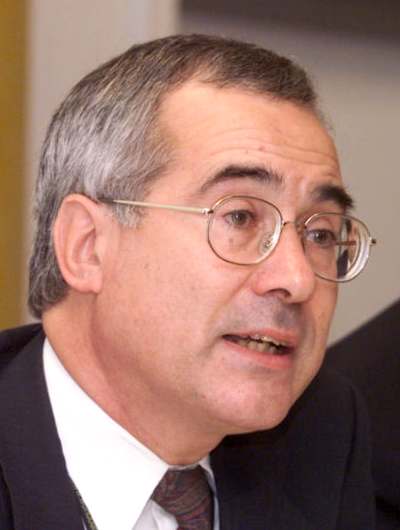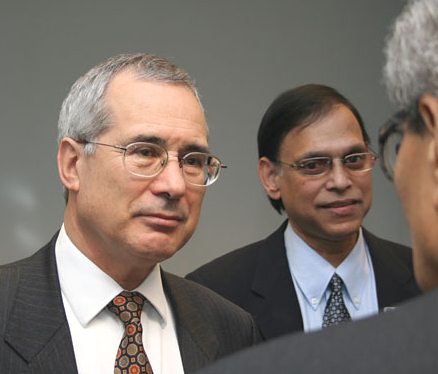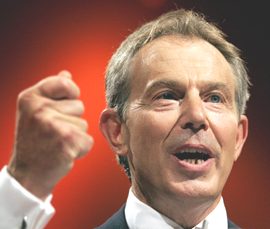|
Sir
Nicholas Stern (born 22 April
1946) is a British
economist and academic. He was the Chief Economist
and Senior Vice-President of the World
Bank from 2000 to 2003, and is now a civil servant and government
economic advisor in the United Kingdom.
He
earned his Bachelor of Arts degree in mathematics at Peterhouse,
Cambridge, and his Doctor of Philosophy in economics at Nuffield College,
Oxford. He was a lecturer at Cambridge
University from 1970 to 1977, and served as a Professor of Economics
at the University of Warwick from 1978 to 1987. He taught from 1986 to
1993 at the London School of Economics, becoming the Sir John Hicks
Professor of Economics, a role which he still occupies. From 1994 until
1999 he was the Chief Economist and Special Counsellor to the President of
the European Bank for Reconstruction and Development. His research focused
on economic development and growth, and he also wrote books on Kenya and
the Green Revolution in India.

Sir
Nicholas Stern
After
his time working for the World Bank, Stern was recruited by Chancellor of
the Exchequer Gordon Brown
to work for the British government where, in 2003, he became second
permanent secretary at H.M. Treasury, initially with responsibility for
public finances, and head of the Government Economic Service. Having also
been Director of Policy and Research for the Commission for Africa,
he was, in July 2005, appointed to conduct reviews on the economics of climate
change and also of development, which led to the publication of the
Stern Review. He ceased to be a second permanent secretary at the Treasury
though he retains the rank; the review team he heads is based in the
Cabinet Office.
The
Stern Review was released on 30 October 2006, and gained global media
attention for Stern's conclusions on the potential impact of climate
change, including the statement that "our actions over the coming few
decades could create risks of major disruption to economic and social
activity, later in this century and in the next, on a scale similar to
those associated with the great wars and the economic depression of the
first half of the 20th century."
Awards
and recognition
Stern
was elected as a Fellow of the British Academy in 1993; he is also an
Honorary Fellow of the American Academy of Arts and Sciences.
In
2004 he was made a Knight Bachelor. Stern was awarded an Honorary
Doctor of Science degree by the University of Warwick in 2006.
A
Stern Warning - The report: 'If we act now, we can avoid the very worst'
World economies do not have to suffer while we deal with climate
change, said Sir Nicholas Stern
LONDON
-- Unchecked global warming will devastate the world economy on the scale
of the world wars and the Great Depression, a British government report
said Monday, as the country launched a bid to convince doubters that
environmentalism and economic growth can coincide.
Britain
hired former Vice President Al Gore, who has emerged as a powerful
environmental spokesman since his defeat in the 2000 presidential
election, to advise the government on climate change -- a clear
indication of Prime Minister Tony Blair's dissatisfaction with current
U.S. policy.
THE economic wellbeing of Britain and the rest of the world depends on
changing to a low-carbon global economy, the Government’s chief
economist said in a report published yesterday.
Sir Nicholas Stern described climate change as the “greatest and
widest-ranging market failure ever seen”, but said that action can and
should be taken to avert the worst effects.
In The Economics of Climate Change, commissioned by the
Treasury, Sir Nicholas said that the problem could be tackled without
stunting economic growth.
He concluded that spending 1 per cent of gross domestic product each
year on tackling climate change would save 5 to 20 per cent of GDP by the
end of the century, but that Britain could not act alone — it required
internationally agreed measures.
“The conclusion of the review is essentially optimistic,” said Sir
Nicholas. “There is still time to avoid the worst impacts of climate
change if we act now and act internationally. We can grow and be green.”
The report identified carbon pricing, including carbon-emissions
trading worldwide and green taxes, improved low-carbon technology, energy
efficiency and halting deforestation as the main methods of cutting
greenhouse-gas emissions.
In his assessment of global warming Sir Nicholas, head of the
Government Economic Service and the former chief economist at the World
Bank, said that the “scientific evidence is now overwhelming” that
climate change is under way and “presents very serious risks”.
He accepted that the world has warmed up half a degree since the
Industrial Revolution and that a minimum of another half degree can be
expected over the next few decades. He blamed man-made greenhouse gases
such as carbon dioxide and methane. The level of greenhouse gases in the
atmosphere is about 430 parts per million, compared with 280ppm before the
Industrial Revolution.
The report said that the level will reach 550ppm by 2050 at the current
rate of increase, but the levels are rising so fast that 550ppm “could
be reached as early as 2035”.

Sir
Nicholas Stern meeting world leaders
As levels increase, temperatures are expected to rise. A 550ppm level
gives a 77-99 per cent chance of an increase above 2C (3.6F), and doing
nothing about emissions gives a 50 per cent risk of a 5C rise by the end
of the century.
“Such changes would transform the physical geography of the world,”
the report states, with many millions, of people facing starvation, water
shortages or homelessness.
The melting of glaciers would initially cause floods but would then
leave a sixth of the world population facing water shortages. Sea rises
would threaten cities, including London and New York, and a rise of 2C
would put 15-40 per cent of wildlife at risk of extinction.
Falling crop yields could leave hundreds of millions of people,
especially in Africa, at risk of starvation and, once temperatures have
risen by 4C, “global food production is likely to be seriously
affected”.
Scientists are clear, said Sir Nicholas, that the higher the
temperature rise the worse the impact on people and economies will be.
Developing countries are likely to be hit hardest, but developed
nations will also suffer. The cost of flooding in Britain if temperatures
rise 3C or more is estimated at up to 0.4 of GDP and in the US stronger
hurricanes are expected to double the costs of wind damage.
With strong, deliberate policy choices it is possible to
‘decarbonise’ both developed and developing economies on the scale
required for climate stabilisation, while maintaining economic growth in
both.”
He ruled out limiting greenhouse-gas levels close to those of today
because of the expense, but said that a level of 450-550ppm, causing
temperatures to rise by 2-3C, was achievable and desirable environmentally
and economically. However, he cautioned: “There is a high price to
delay. Weak action in the next 10-20 years would put stabilisation even at
550ppm beyond reach — and this level is already associated with
risks.”
Stabilisation at or below 550ppm would require global emissions to reach
their peak in 10-20 years and then fall by 1-3 per cent every year, with
global emissions in 2050 being 25 per cent of today’s level. By then the
world economy is expected to be three or four times more valuable.
The cost of limiting greenhouse gases to a maximum of 550ppm is
estimated at 1 per cent of GDP, which is described as “significant but
manageable” while simultaneously offering business opportunities as the
markets for low-carbon, high-efficiency goods and services expand and
removing most of the risks associated with climate change.
The review team assessed the cost of combating climate change by
comparing models for the development of low-carbon technologies with the
alternative of “business as usual” — doing nothing — at the same
time assessing the “system-wide effects” of changing to a low-carbon
economy. Improved energy efficiency is highlighted as the biggest area
where emissions can be reduced, with the bonus of saving companies money.

Sir
Nicholas Stern on Global Warming and CO2
In the medium and long term, industry would have to turn to clean
power, heat and transport technologies. The power sector would have to
reduce carbon emissions by 60-75 per cent by 2050. Efficiency improvements
in existing clean technology would be required to provide a competitive
alternative to fossil fuels.
Coal and gas would still provide more than half the world’s power by
2050 and Sir Nicholas advocated carbon capture and storage to slash their
emissions.
Preventing deforestation is highlighted as a cheap means of reducing
emissions. Deforestation has increased world emissions by 18 per cent
because trees and other plants store carbon. Wealthy nations should, the
report says, compensate poorer logging nations for saving trees.
Sir Nicholas regards the 1 per cent GDP cost as small compared with the
risks and costs of climate change. The development of business opportunities from new technology would be
a significant compensation, with markets for low-carbon energy products
expected to be worth £300 billion by 2050.
The damage being caused is calculated at £45 per tonne of carbon
dioxide and, by comparing the cumulative costs against social costs, the
world economy would save an estimated £1.3 trillion by the middle of the
century if it limited greenhouse gases to 550ppm.
The report argues: “Innovation driven by strong policy will
ultimately reduce the carbon intensity of our economies and consumers will
then see reductions in the prices they pay as low-carbon technologies
mature.” Tackling climate change would, the review said, require the
introduction of carbon pricing and a range of green taxation schemes.
Among the measures involved would be the expansion of the European
Union trading scheme so that it operated worldwide and included more
sectors of the economy, including transport. By putting a price on carbon,
people — as individuals and in their business roles — would be
“faced with the full cost of their actions”.
Technological developments required huge investment and public spending
on research had slumped since the 1980s, a trend that needed to be
reversed to address climate change.
Changes in behaviour would also be needed and the report called for
better information on energy efficiency to be given to the public, while
new regulations would help to ensure similar changes from industry.
The Stern report concluded: “It is already very clear that the
economic risks of inaction in the face of climate change are very severe.
There are ways to reduce the risks. With the right incentives the private
sector will respond and can deliver solutions. The stabilisation of
greenhouse gas concentrations in the atmosphere is feasible at significant
but manageable costs.
“Above all, reducing the risks of climate change requires collective
action. It requires co-operation between countries. It requires a
partnership between the public and private sector. It is still possible to
avoid the worst impacts of climate change but it requires strong and
urgent collective action. Delay would be costly and dangerous.”
Climate
Change
Bill
A
BILL
TO MAKE PROVISION TO CONTROL EMISSIONS OF CARBON DIOXIDE
Section
1 – Principle aim of the Bill
The
Prime Minister shall have the principle aim of restricting emissions of
carbon dioxide in any year to the “annual target figure” for that
year, for every year from 2010 to 2050.
The
“annual target figure” for 2010 shall be 126 MtC (20 per cent below
1990 level) and for each succeeding year shall be reduced by 3 per cent.
Section
2 – Strategies and reports on achieving the principle aim
The
Prime Minister shall publish, and may from time to time amend, a strategy
to achieve the above aim, which shall include :
•
Targets for each sector and policies to achieve those targets
•
Analysis of the performance of past policies to reduce CO2
•
Analysis of Government tax and spend on CO
2
emissions (including
market mechanisms that don’t technically count as tax!) and how the
polluter pays principle may be used to cut them.
It
will also be the duty of the Prime Minister to ensure that the secondary
sectoral targets set out in Schedule
1 are met.
The
Prime Minister shall report annually (including in years before 2010) to
Parliament on progress in implementing the strategy and any amendments
proposed. Parliament shall debate and vote on whether to accept the
report.
The
figures in the report shall be verified by the National Audit Office.
Section
3 – process to be followed if targets are missed
If
carbon dioxide emissions are greater than the target value the report
above shall include :
•
an analysis of which policies fell short and why
•
additional policies (or extensions to existing policies) needed to reach
target in future years.
If
carbon dioxide emissions exceed the target by more than 5 per cent,
the committees who monitor departments responsible for climate
change
policy (transport, environment, industry, treasury, public accounts etc)
can propose policies or changes to policies to cut CO2 emissions and can
require that these proposals are debated and voted on by both Houses of
Parliament.
If
carbon dioxide emissions exceed the target by more than 10 per cent, the
Prime Minister and any Secretary of State whose department has not met the
sector targets for which they were responsible shall have his salary
reduced by 10 per cent.
Section
4 – MPs duties to tackle climate
change
Every
MP shall publish an annual report to constituents (on a website or in a
local paper) specifying :-
(a)
any action they have taken to prevent climate
change
(b)
the ways in which they have acted to hold relevant Secretaries of State to
account, including through their voting in Parliament
Schedule
1 – Secondary statutory targets
Secondary
sectoral targets that shall be made statutory on Government are :-
•
Domestic energy efficiency improvement of 20 per cent by 2020 from 2010
levels (White Paper).
•
Non domestic energy efficiency improvement of 7.9 MtC by 2010 (energy
efficiency
implementation
plan) and an extra 4MtC by 2020
•
Renewable electricity generation (10 per cent by 2010, 20 per cent by
2020),
•
a specific target for microgeneration to be set pursuant to Section 82 of
the Energy Act
•
CHP target of 10Gw by 2010 (Manifesto and White Paper)
Explanatory
Notes
Section
1 – principle aim of the Bill
Defines
a path that carbon dioxide emissions must follow. The path starts at
Labour’s manifesto commitment for a 20 per cent cut in 1990 levels by
2010, with annual cuts of 3 per cent each year through to 2050. (This is
approx a 74 per cent cut on the current levels by 2050.) The clause makes
achievement of this path a “principle aim” of the Prime Minister.
Section
2 – Strategies and reports on achieving the principle aim
Require
the PM to publish a strategy on how the principle aim will be met, and
gives him the power to amend this strategy as required. It also requires
annual reporting by the PM on progress.
Section
3 – process to be followed if targets are missed
This
clause comes into effect if there is a failure to keep to the defined
path. The clause sets out a progressive response to failure, in
recognition that the path is not likely to be a simple straight line, as
something as random as a
particularly cold winter could cause a temporary rise in
CO2
emissions.
Therefore,
if actual emissions are less than 5 per cent above the target, all that is
required is for Government to announce the necessary policies to make up
the shortfall in future.
If
repeated failures or a particularly large failure in any one year leads to
emissions exceeding the target level by 5 per cent-10 per cent, those
Parliamentary Committees that scrutinise departments responsible for
delivering CO2 cuts will be given the power to suggest additional
policies, and require Parliament to vote on them. This could include those
Select Committees scrutinising the environment department, the transport
department, the Treasury (tax and spending will play a key role in cutting
CO2 emissions), the
trade/industry department, and the agriculture department.
In
the case of severe failure of more than 10 per cent, the Secretaries of
State responsible for delivering CO2 cuts would see their salaries cut by
£5000. (Although this may be considered an unusual reprimand MPs have in
the recent past had effectively had their salaries docked for misconduct
by being suspended without pay from the Commons for a short period, and a
standard opposition “censure” motion for Ministers usually includes a
token salary cut).
These
mechanisms are additive. In other words, in the case of a major failure,
all three mechanisms operate, not merely the salary cut.
Section
4 – MPs duties to tackle climate
change
Requires
MPs to report on their actions annually to constituents.
Schedule
1 – Initial statutory targets
Makes
key Government targets from policy documents such as the Climate
Change
White Paper legally binding – increasing the priority Ministers must
give them. Different views on this have been expressed – see attached paper
for discussion.

Tony
Blair on Climate Change
LINKS
and REFERENCES
-
Robert
Peston (29 October 2006). "Report's
stark warning on climate". BBC.
-
"Climate
change fight 'can't wait'". BBC. - video, executive summary
and slide show.
-
The
British Academy (2006). British
Academy Fellows Archive. Retrieved October 31, 2006.
-
Press
and Information Office - LSE (2006). News
and Views: Volume Thirty-Four • Number Nine • 21 June 2004.
-
University
of Warwick (2006). University
of Warwick Honorary Degrees announced for July 2006. Retrieved
October 31, 2006.
Stern's
report: 'If we act now, we can avoid the very worst'
... Sir Nicholas Stern described climate change as the
“greatest and ... of the review is essentially optimistic,”
said Sir Nicholas. ... We can grow and be green.”. .
Stern
warning Times Online
Stern
outlines moral duty to tackle climate change Register
UK
climate change review calls for new green tax measures UPDATE Life
Style Extra
Guardian
Unlimited - New
Zealand Herald
Stern
by name, stern by nature
Guardian Unlimited, UK
Those who know the diminutive Sir Nicholas Stern, Treasury and
World ... the economics of climate change, Sir Nicholas has
been ... proposing a rise in green taxes
Whitehall
braced for Stern climate warning Yorkshire Post Today
David
Aaronovitch Times Online
UK
climate change review calls for new tax measures on ... Life
Style Extra
Telegraph.co.uk -
Belfast
Telegraph
Stern
measures that can save the planet
Times Online, UK
... The measure of effective green levies must be twofold ...
But Stern’s second serious contribution is to ... Sir
Nicholas’s chief proposal is that governments work
Business
welcomes Stern report Telegraph.co.uk
Stern
Warning On Climate Change Green Building Press
Future
hangs on now Courier Mail
People
& the Planet - Guardian
Unlimited
Anderton
slams stern report
TVNZ, New Zealand -
... World Bank economist Sir Nicholas Stern looks at air
transportation of agricultural exports as a possible area for new green
taxes. In the report, he also .......
Alterative
motive behind kiwifruit claims Newstalk ZB
Alarm
erupts over climate tax on trade New Zealand Herald
Climate
change plan fears for NZ exports Stuff.co.nz
National
Business Review - New
Zealand Herald
$9
trillion the cost of global warming: Stern Report
ABC Online, Australia ... Really what we learn from the
work that Sir Nicholas Stern has done is that the world does ...
Green groups will be hoping that this economic report card
may ...
Greens blasts
govt over climate change Ninemsn
Q&A:
Stern report on climate change
BBC News, UK ... if climate change is not averted,
according to a report by economist Sir Nicholas Stern. ...
Too often governments dodge green laws by insisting that other ...
Global
warming report calls for action
United Press International ... "That is
manageable," said the report's author, Sir Nicholas Stern,
former chief economist for the World Bank. "We can grow and be green.".
"The task is urgent. ...
Tackling
Global Warming Cheaper Than Ignoring It Slashdot
Global
Warming Could Significantly Impact World Economy, Study ... NewsHour
Report
warns act now to prevent climate change
InTheNews.co.uk, UK ... chief economist of the
World Bank Sir Nicholas Stern and commissioned ... Of the report's
findings, Friends of the ... Catherine Pearce said: "The green
technology to ...
PM
warns NZ markets at risk over climate change
Radio New Zealand, New Zealand ... The Prime
Minister told Morning Report that New Zealand ... now
accepts the need for green policies ... Sir Nicholas
Stern says that with current trends, average global ...
Global
warming disaster will happen in our lifetime, warns Blair
This is London, UK ... as the Government launched
the report of Sir Nicholas Stern's review of ... the
way to large increases in green taxes ... Speaking at the report's
launch in London, Mr ...
A
taste for adventure capitalists

Solar
Cola - a healthier alternative
|



